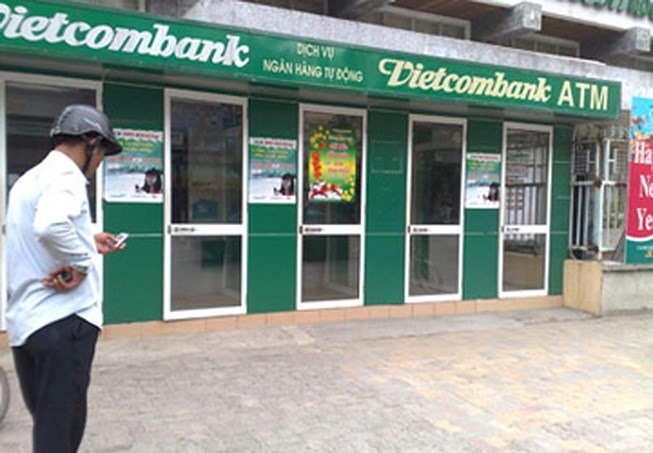 |
| Vietcombank will officially increase service fees for ATM cash withdrawals from VNĐ1,100 to VNĐ1,650 for each transaction in its system from July 15. - Photo plo.vn |
Viet Nam News HÀ NỘI – After two months postponing the increase in service fees for ATM cash withdrawals as required by the central bank, some commercial banks have now resumed the plan, announcing that a new service fee framework will apply from the middle of this month.
Three big banks Vietinbank, Vietcombank and BIDV will officially increase service fees for ATM cash withdrawals from VNĐ1,100 to VNĐ1,650 for each transaction in their system from July 15.
Earlier, commercial banks had to cease their plans to hike service fees as required by the State Bank of Việt Nam (SBV). The SBV on May 9 directed commercial banks to stop increasing ATM cash withdrawal fees at that time after the public expressed their disagreement over increased fees on ATM transactions and e-banking services at many banks.
According to SBV, it regulates a fee framework for ATM cash withdrawals and commercial banks must follow it to set their own fees. The banks’ recent fee hike doesn’t violate the SBV’s regulation.
The central bank’s Circular 35, which came out in 2012, allowed banks to collect ATM fees from March 2013. The maximum fee of VNĐ3,300 for each transaction has been permitted since 2015 but most banks have kept their fees at either VNĐ1,100 or VNĐ1,650.
However, SBV noted, for any fee adjustments, besides making information transparent, banks should look into the interests of customers to ensure a balance between the two sides.
E-wallets on the rise
As banks have hiked service fees on ATM withdrawals as well as online and mobile banking, e-wallet service providers are applying free services to attract customers.
Nguyễn Ánh Hồng in Hà Nội said that she used e-wallet Vi Viet to pay online for utilities, internet, and her mobile phone bills every month. She even used this app to pay when going out with friends or family. Recently, as numerous banks had moved to adjust service fees, she had used the e-wallet more frequently.
Local media have quoted leaders of some banks confirming that customers are turning towards e-wallets to pay bills, shop, and transfer money. E-wallets also provide some extra services to compete with banks’ internet and mobile banking services. Notably, it is very easy to register new accounts via smartphone.
Bùi Quang Tín, a banking expert, told vietnamnet.vn that the 132 million cards issued by banks did not mean banks can control the market. To date, 25 non-bank institutions had been providing intermediary payment services.
While Vietnamese banks were still busy collecting fees, payment companies were not, because they strove for a long-term business strategy, Tín said, adding that they had calculated thoroughly when accepting losses in the first phase of operation.
If payment companies could attract more users, they would have huge capital to use which could bring bigger benefits than the fees they collect from services.
“The competition in the payment market is getting fierce. If banks don’t change their strategy, they will lose their share in the home market,” Tín warned.
There are now about 20 e-wallet service providers in Việt Nam, including well-known names such as Momo, Ngan Luong, VTC Pay and Payoo. However, there is no official report from the SBV about the number of Vietnamese e-wallet users. Service providers estimate that 10 million e-wallets are in use in Việt Nam, which is a modest figure compared with the great potential of the market, analysts say. — VNS
 Economy
Economy

